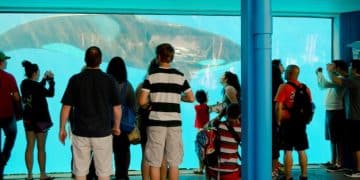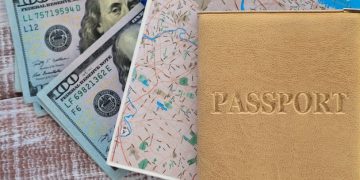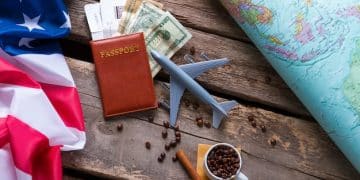US Visa Requirements: 2025 Updates for International Travelers

Navigating the **US Visa Requirements: Updates for International Travelers Visiting in 2025** involves understanding evolving regulations, application procedures, and eligibility criteria, ensuring a smooth entry process for tourism, work, or study purposes.
Planning a trip to the United States in 2025? Staying informed about the **US Visa Requirements: Updates for International Travelers Visiting in 2025** is crucial for a hassle-free journey. Let’s explore the latest changes and essential information you need to know.
Understanding the Basics of US Visa Requirements in 2025
The foundation of **US Visa Requirements: Updates for International Travelers Visiting in 2025** relies on several key factors. These factors include the purpose of your visit, your country of origin, and the duration of your stay. Understanding these basics is the first step in a successful visa application.
Visa Categories: Tourist, Business, and More
The US offers various visa categories to accommodate different travel purposes. The most common include the B-1/B-2 visa for tourists and business visitors, the F-1 visa for students, and the H-1B visa for specialty occupation workers.
The Visa Waiver Program (VWP)
The Visa Waiver Program allows citizens of certain countries to travel to the US for tourism, business, or transit for up to 90 days without a visa. However, they must obtain approval through the Electronic System for Travel Authorization (ESTA) before their trip.
- Check your eligibility for the VWP.
- Apply for ESTA well in advance of your travel dates.
- Understand the limitations of the VWP regarding the length of stay.
In conclusion, staying up-to-date with the fundamentals of US visa requirements is essential for all international travelers. By understanding these guidelines, you can ensure a straightforward and compliant entry into the US.
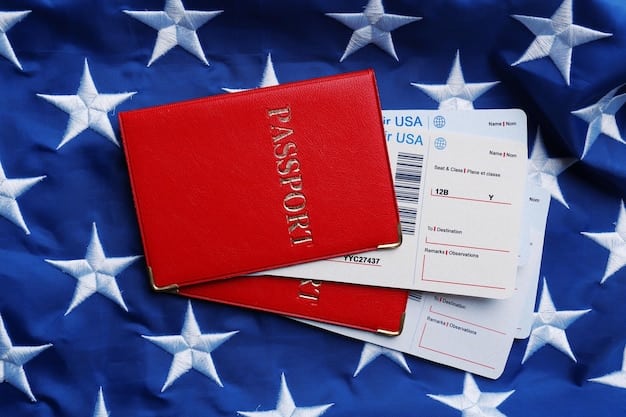
Key Updates to US Visa Application Processes for 2025
Several significant changes have been introduced in the visa application processes for 2025. These updates impact everything from online application forms to interview procedures, so staying informed is essential.
Revised Online Application Forms (DS-160)
The DS-160, the online nonimmigrant visa application form, has been updated to include additional questions regarding travel history, security concerns, and public health. Accuracy and thoroughness are more critical than ever.
Biometric Data Collection Enhancements
The US government has enhanced its biometric data collection methods at embassies and consulates worldwide. This includes more detailed fingerprint scans and facial recognition technology to improve security and identify potential risks.
- Ensure all information on the DS-160 is accurate and up-to-date.
- Familiarize yourself with the enhanced biometric data collection process.
- Prepare for potential delays due to increased scrutiny during the application.
To summarize, understanding and adapting to the latest updates in US visa application processes is crucial in 2025. By staying informed about these changes, you can enhance your chances of a successful application.
Documentation Requirements: What You Need to Prepare
Gathering the right documentation is a pivotal part of the **US Visa Requirements: Updates for International Travelers Visiting in 2025**. The specific documents required will vary based on your visa type, but some essential items are universally required.
Essential Documents for All Visa Applicants
Regardless of the visa type, every applicant must provide a valid passport, a completed DS-160 form, passport-sized photographs, and proof of payment for the visa application fee.
Additional Documentation Based on Visa Type
Depending on the visa you are applying for, additional documents may include an invitation letter, proof of financial stability, academic transcripts, employment verification, and a detailed travel itinerary.
- Keep your passport valid for at least six months beyond your intended stay.
- Gather all required documents well in advance of your interview.
- Organize your documents in a clear and accessible manner.
In conclusion, preparing all the necessary documentation is vital for a smooth visa application process. Understanding what is needed and organizing your materials effectively can significantly increase your chances of approval.
Navigating the Visa Interview Process
The visa interview is a crucial step in obtaining a US visa. It provides consular officers with the opportunity to assess your eligibility and intentions for visiting the United States.
Preparing for Your Visa Interview
Proper preparation can alleviate anxiety and increase your chances of a successful interview. Review your application thoroughly, anticipate potential questions, and prepare clear and concise answers.
Common Interview Questions and How to Answer Them
Common questions include the purpose of your visit, your ties to your home country, your financial resources, and your travel history. Answer honestly and provide detailed explanations to support your claims.
- Dress professionally for your visa interview.
- Arrive on time and be respectful to the consular officer.
- Answer questions honestly and provide clear, concise answers.
Overall, approaching the visa interview with confidence and thorough preparation can greatly improve your chances of success. By understanding the process and answering truthfully, you can navigate this crucial step effectively.
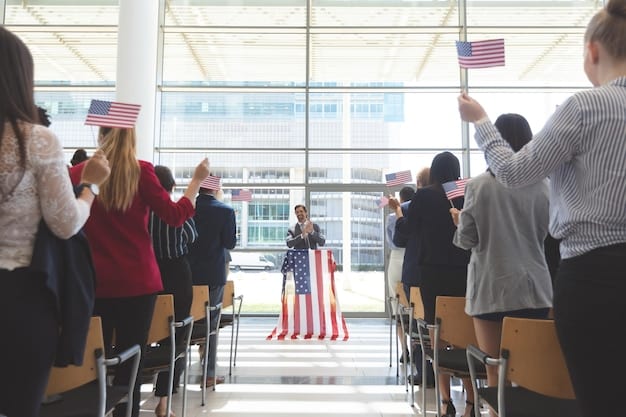
Common Reasons for Visa Denial and How to Avoid Them
Understanding the common reasons for visa denial is crucial for ensuring a successful application. Identifying potential pitfalls and taking proactive steps to avoid them can significantly improve your chances of approval.
Lack of Evidence of Ties to Home Country
One of the most frequent reasons for visa denial is the applicant’s inability to demonstrate strong ties to their home country. Consular officers need assurance that you intend to return after your visit.
Incomplete or Inaccurate Application Forms
Incomplete or inaccurate information on your DS-160 form can raise red flags and lead to denial. Ensure all details are accurate and consistent with your supporting documents.
- Provide ample evidence of your ties to your home country, such as property ownership, employment contracts, and family responsibilities.
- Double-check all information on your application form for accuracy and completeness.
- Seek legal advice if you have a complicated case or a history of visa denials.
To summarize, preventing common reasons for visa denial involves thorough preparation, accurate documentation, and a clear demonstration of your intentions to comply with visa regulations. Being proactive in addressing potential issues can greatly improve your chances of a successful outcome.
Travel Recommendations and Cultural Tips for Visitors in 2025
Beyond the visa requirements, being aware of travel recommendations and cultural tips can greatly enhance your experience in the US. Understanding local customs and being mindful of your surroundings ensures a smooth and enjoyable visit.
Safety and Security Tips for Tourists
Stay informed about local safety conditions and potential risks. Be aware of your surroundings, especially in crowded tourist areas, and take precautions to protect your belongings.
Cultural Etiquette and Local Customs
Familiarize yourself with American customs and etiquette. Be respectful of local laws and traditions, and be mindful of cultural differences in communication and behavior.
- Purchase travel insurance to cover potential medical emergencies or unexpected events.
- Respect local laws and customs, including traffic regulations and noise ordinances.
- Learn basic English phrases to facilitate communication with locals.
In conclusion, by preparing for your trip beyond the visa application, you can ensure a rewarding and memorable experience in the US. By staying informed and embracing cultural awareness, you can navigate your travels with confidence and respect.
Resources for Staying Updated on Visa Changes
Staying informed about the latest **US Visa Requirements: Updates for International Travelers Visiting in 2025** is an ongoing process. Numerous reliable resources can provide you with up-to-date information and guidance.
Official Government Websites
The US Department of State and the US Embassy websites are primary sources for visa information. These sites offer official guidelines, application instructions, and updates on policy changes.
Reputable Immigration Law Firms and Consultants
Engaging with reputable immigration law firms and consultants can provide you with expert advice and support. These professionals can help you navigate the complexities of the visa application process.
- Regularly visit the official US Department of State website for updates.
- Subscribe to email alerts from US embassies for the latest visa news.
- Consult with qualified immigration professionals for personalized guidance.
Finally, staying proactive and utilizing reliable resources will ensure you remain informed about the evolving landscape of US visa requirements. With the right knowledge, international travelers can navigate the application process with confidence and clarity.
| Key Aspect | Brief Description |
|---|---|
| 🛂 Visa Categories | Different visas for tourism, work, study, etc. |
| 📝 Application Updates | Revised forms, enhanced biometric data collection. |
| 📑 Required Documents | Passport, DS-160, photos, financial proof. |
| 🚫 Visa Denials | Lack of home ties, incomplete forms, fraud. |
Frequently Asked Questions
▼
The VWP allows citizens of participating countries to travel to the US for tourism, business, or transit for up to 90 days without a visa, requiring only an ESTA approval.
▼
You can check your visa application status online through the Consular Electronic Application Center (CEAC) website by entering your application ID or case number.
▼
You typically need your passport, DS-160 confirmation page, appointment letter, passport-sized photos, and any supporting documents relevant to your visa type.
▼
If your visa is denied, review the reason for denial, gather any missing or additional information, and consider reapplying or seeking advice from an immigration attorney.
▼
Extending your stay depends on your visa type; some visas allow extensions by applying to the USCIS, while others do not allow you to extend your stay.
Conclusion
Staying informed about the **US Visa Requirements: Updates for International Travelers Visiting in 2025** is crucial for a smooth and successful trip. By understanding the application processes, documentation needed, and potential pitfalls, travelers can confidently navigate the visa system. Always refer to official sources for the most up-to-date information and seek professional advice when needed to ensure a hassle-free journey to the United States.

